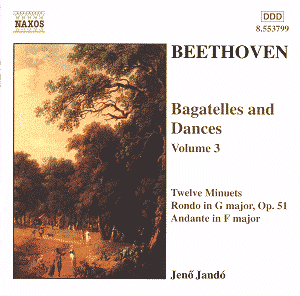The title 'Rage over a lost penny' has guaranteed fame for the first item on this disc and it is (or was) a favourite encore piece; Beethoven's original title was 'In Hungarian style, as a caprice' and is played here with due ferocity flavoured by appropriate mockery. The 'Andante favori' was said to have been written as the original slow movement of the 'Waldstein Sonata' but was rejected on the grounds of being too long. It is a lovely work which is played here with style.
Rondo in C, Opus 51, No. 1 is based upon a song-like main theme which is reminiscent of Schubert, this is then subjected to a series of variations with the theme re-appearing in a number of guises. The Rondo in G, Opus 51, No. 2, is written with a similar format but is based upon a typical Beethoven Andante cantabile flowing theme and with a number of very brilliant variations. The rondo in A, WoO 49 is an early work with a much more simple development. All three Rondos are enjoyable works which tend not to appear in concerts (too short to be substantive items, but not sufficiently brilliant to be presented as encores); all three are well played by Jandó who gives the impression of enjoying them.
The remaining works are dances produced for the many dance halls of Vienna; they comprise two German Dances, which are precursers of the Viennese waltz, and a set of twelve minuets WoO7. This kind of music can so easily sound monotonous (what I think of as the Victor Sylvestre strict tempo effect), However Jandó does not sound bored by these works and makes the sound interesting by means of judicial slight variations of tempo and phrasing.
Overall the music on this disc falls rather into the description of 'odds and ends' which with most composers would not be particularly interesting. However Beethoven wrote very little which is not fascinating. This disc is very well played and recorded and can be recommended to anyone interested in Beethoven's less well known piano pieces.
Arthur Baker

![]() Jeno Jandó (piano)
Jeno Jandó (piano)![]() NAXOS 8.553799
[55.46]
NAXOS 8.553799
[55.46]